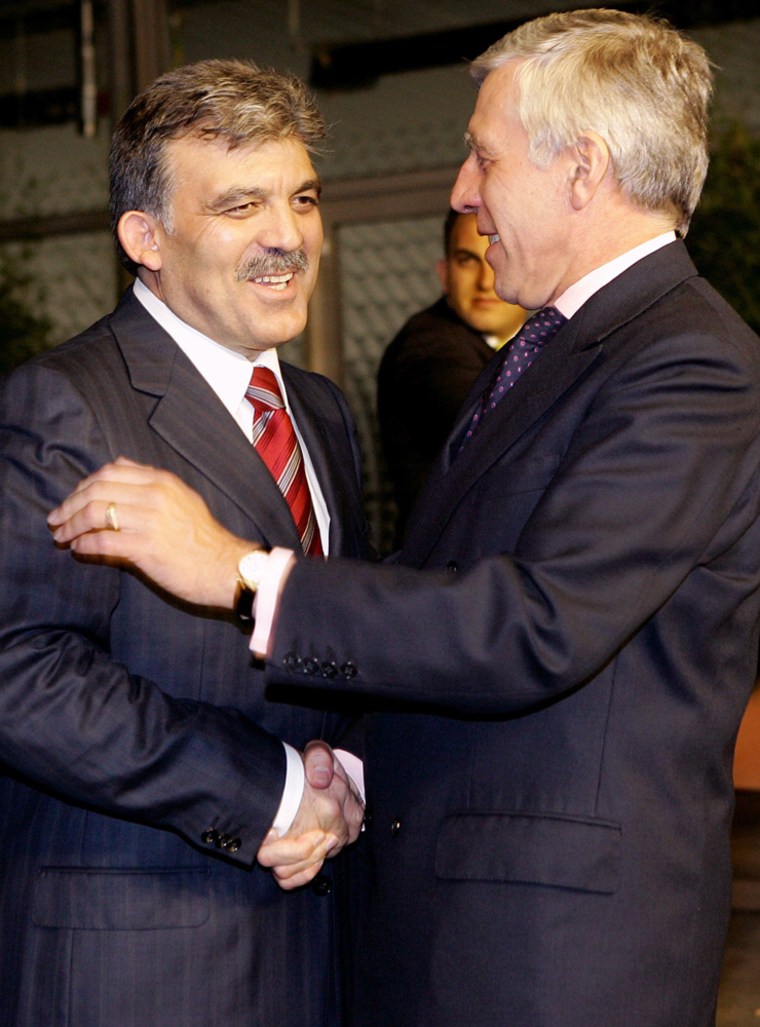The European Union opened membership talks with Turkey early Tuesday — a historic first step that would transform the bloc by taking in a predominantly Muslim nation and expanding its borders to Asia and the Middle East.
Turkish Foreign Minister Abdullah Gul flew late Monday night to Luxembourg for a late-night ceremony to formally open entry talks, following an agreement reached after two dramatic days of diplomacy that included strong U.S. lobbying for Turkey’s candidacy.
“We have reached a historic point,” Gul said in Ankara before boarding his jet. “Turkey will be the only Muslim country in EU.”
The start of negotiations that could last a decade followed weekend crisis talks meant to persuade Austria to drop its last-minute objections to Ankara’s bid for full membership. The 25-nation bloc agreed Monday to open membership talks with Croatia — a key Austrian demand — after the U.N. chief prosecutor gave assurances the government in Zagreb was now cooperating fully in efforts to bring a war crimes suspect to trial.
The negotiations came amid fears that rejecting the only Muslim EU candidate country could destabilize the Turkish government, which has staked its future on building ties with the West. Turkey neighbors Iraq and Iran — and U.S. officials — regard Turkish stability as critical.
Support from the American government
Washington also has showcased Turkey as an example of a Muslim country that is not only pro-Western but also secular and democratic.
But many Europeans have questioned the bloc’s ability to absorb the nation of 70 million people and invoked concerns about admitting a poor and predominantly Muslim nation. Amid deepening fears in Europe toward immigrants, Turkey’s candidacy also raises the prospect of millions more potential newcomers.
British Foreign Secretary Jack Straw told reporters the EU crisis talks were “grueling” — but commended both the EU and the Turkish government for showing “great statesmanship.”
“This is a truly historic day for Europe and for the whole of the international community,” he told reporters late Monday.
The agreement was a rare point of light in a gloomy year for the EU.
Last spring, a proposed EU constitution was shot down in French and Dutch referendums, reflecting a backlash since the bloc took in 10 mostly ex-communist newcomers last year.
The EU economy also is in the doldrums. A mid-June summit left the bloc without a budget for 2007-2013 and last month’s German elections cast doubts on the political direction of the EU’s biggest economy.
Initial opposition from Austria
All 25 EU members had agreed in December to launch entry talks with Turkey on Monday. But last week, Austria suggested that the EU reserve the right to grant Ankara something less than membership if Turkey was unable to meet all membership obligations.
Austrian Foreign Minister Ursula Plassnik had wanted a “privileged partnership” for Turkey, but she eventually relented.
But as talks ran late, Gul delayed his departure for Luxembourg until a deal was in place, saying his country would not accept second-class citizen status in the union.
Although Turkey belongs to NATO and other international groups, its shaky human rights record and poor economic past have kept it from becoming a full member.
Failure to start the negotiations would have been seen as a serious blow to the credibility of the EU, which made Turkey an associate member in 1963 with the prospect of future membership.
In recent years, Ankara has implemented key political and economic reforms and wants the EU to make good on its promise to bring it into the bloc.
Progress on Croatia
In a related development, U.N. chief prosecutor Carla Del Ponte told EU foreign ministers that Croatia — another entry candidate — was cooperating fully to try to bring war crimes suspect Gen. Ante Gotovina to trial.
In a statement, the EU foreign ministers said they were ready to begin entry talks now that “Croatia had met the outstanding condition for the start of accession negotiations.” The talks were expected to officially open Tuesday.
Austria, which borders Croatia, had pushed hard for the EU to restart the talks, arguing it was unfair that it be penalized. It had linked Croatia’s membership bid to its opposition to starting Turkey’s entry talks, although EU officials insisted earlier Monday that the two entry talks were not connected.
Straw said the decision to freeze the talks was a difficult one for the EU, especially since the EU hopes to encourage stability in the Balkans by offering nations there the hope of joining the club.
“It has been difficult for Croatia, and it has been difficult for the EU,” he said.
